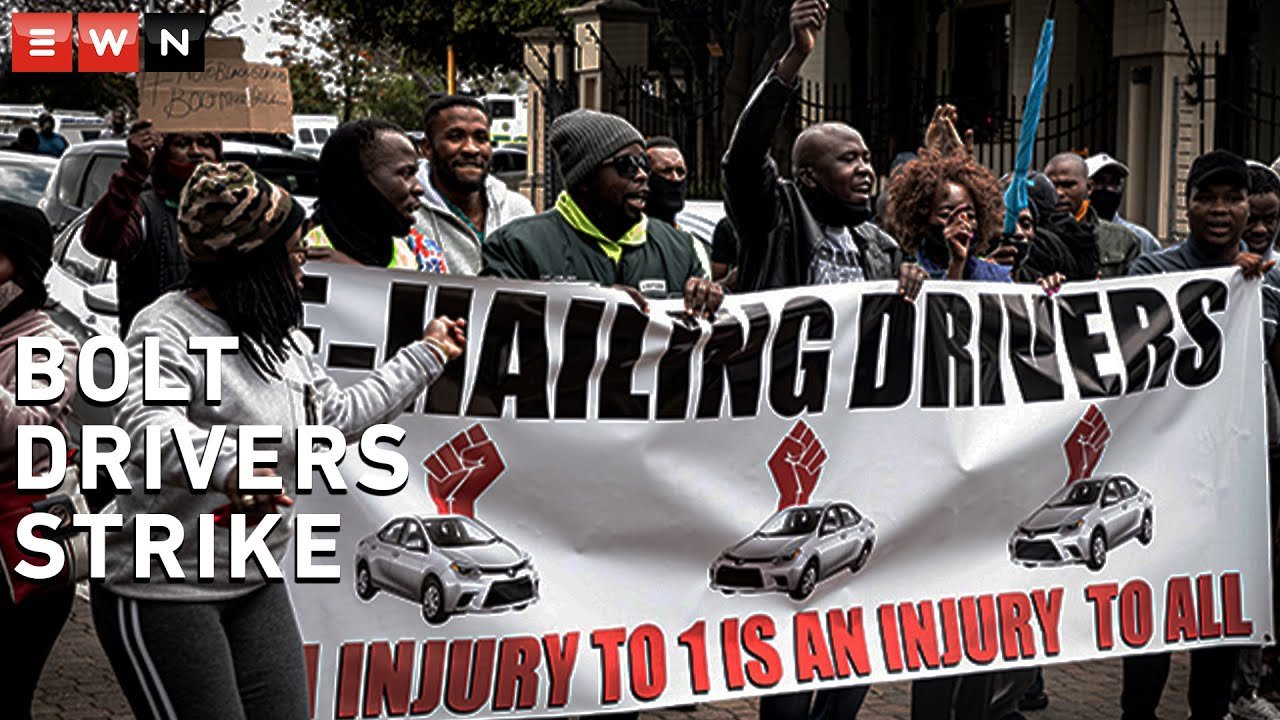General News
Bolt Blocks And Sacks Drivers Who Threatened Others During E-hailing Strike

The e-hailing motorist app Bolt says it has permanently blocked motorists who hovered and bullied the motorists who decided to work during last week’s three daye-hailing strike.
Uber, Bolt, Didi and othere-hailing motorists had offered a massive strike, demanding chow increases and government regulation in the sector.
The strike came as motorists complained that they weren’t making gains since the price of energy had surpassed R20 a litre from late last time.
Uber responded by adding base fares for short lifts but didn’t change its pricing model. Bolt increased its fares, by at least R1 a kilometre, and increased base fares across several lift orders.
ISLAMABAD All eyes are now on the National Assembly as it’s set to meet then on Monday ( moment) after a two- day recess, with an opposition- moved no- confidence resolution against Prime Minister Imran Khan and a government- patronized constitution correction bill seeking the creation of the south Punjab fiefdom on its docket.
Interior Minister Sheikh Rashid Ahmed told a news conference on Sunday said the voting on the no- trust stir would take place on April 4 if National Assembly Speaker Asad Qaiser allowed its tabling on Monday, intimating that the government could further delay the process.
The strike also saw an enormous increase in fares, with some lifts paying up to four times further than the usual price as there were limited buses available during the strike.
In a advertisement transferred to Bolt motorists on their driving operation, Bolt said it had since permanently blocked motorists who it had factual substantiation that they had either bullied or been violent towards motorists who operated during the strike.
Bolt said it admired the motorists’ right to protest and hadn’t taken action against those who chose to do so peacefully.
“We have always appealed to drivers to do so legally, peacefully, and without impacting the rights of other drivers who choose to continue operating and earning an income.
“Bolt unequivocally condemns and will not tolerate any form of violence directed towards e-hailing drivers and passengers or other bystanders.
“We believe every South African has the right to earn a living and move around without risk of harm, intimidation or coercion, or fear of death or injury.
“No drivers have been blocked from the platform for exercising their right to protest this past week,” it said.
But, Bolt said it permanently blocked the motorists who were bogarting or violent.
Bolt has come under severe review in recent times after a woman was allegedly abducted and ravished by a motorist.
“Bolt can confirm that some drivers have been permanently blocked from using Bolt as a result of their own actions during this recent protest. They were blocked for these reasons: intimidating non-protesting drivers, threatening other drivers with physical harm, inflicting physical harm on other drivers or their property.
“These drivers were blocked because their actions were reported through the app, along with photographic or video evidence of their actions – no drivers were blocked without Bolt having clear evidence (on which) to base our decisions.
“We’ll continue to work on new features to improve driver safety on the platform and we’ll share more information about them when they are ready to be rolled out,” said Bolt.
Bolt has also been criticised for failing to block or stop the frequence of rented biographies on the service, an act whereby motorists use the individualities of third parties to carry oute-hailing lifts on the app.
Bolt motorists have also complained of not feeling safe on the app as they too say they’ve been burgled of plutocrat and their effects by culprits posing as riders.
Bolt didn’t incontinently reveal how numerous motorists it had blocked on its platform due to incidents related to violence and the strike last week.
General News
Cape Town Police Seize Counterfeit Goods Worth R5.1 Million in Bellville Raid

Police in Cape Town have received praise for their recent efforts to combat the illegal trade of counterfeit goods, resulting in the recovery of over R5 million worth of fake merchandise.
The successful operation, which took place in Bellville on Thursday afternoon, saw a collaborative effort from various law enforcement agencies.
Lieutenant Colonel Malcolm Pojie, the provincial police spokesperson, stated that the operation involved members of the South African Police Service (SAPS), Customs, Home Affairs, and brand protectors from various popular products. The coordinated effort targeted a shopping complex near the Bellville taxi rank, where previous similar operations had been conducted.
Despite finding most stores abandoned upon arrival, SAPS members pressed forward with the operation. Three Somalian men in their mid-thirties were apprehended, and counterfeit goods valued at approximately R5.1 million were seized during the operation.
One of the suspects was discovered in possession of a range of crucial documents inside a shop posing as a copy center.
These documents included passports, certificates such as birth and asylum papers, as well as vehicle licenses and a money counting machine.
The arrested individuals are facing charges related to the possession of counterfeit goods and fraud, with further charges pending as the investigation unfolds. They are scheduled to appear in the Bellville Magistrate’s Court.
Lieutenant General Thembisile Patekile, the Western Cape police commissioner, condemned the trade of counterfeit goods as economic sabotage and commended the team for their successful operation. He also issued a stern warning to building owners and landlords who turn a blind eye to illegal activities on their premises.
The seizure of over R5 million in counterfeit goods marks a significant victory in the ongoing battle against illicit trade, demonstrating law enforcement’s commitment to protecting consumers and the economy from fraudulent activities.
General News
Limpopo Police Launch Investigation into Shocking Murder of 63-Year-Old Man

In a shocking incident that has left the community of Thohoyandou in Limpopo in disbelief, a 63-year-old man was brutally murdered in his own home.
The victim, whose identity is yet to be disclosed, was fatally shot while sleeping in his house in Tshitereke Thondoni.
The incident took place in the early hours of Thursday, as confirmed by Limpopo provincial police spokesperson, Colonel Malesela Ledwaba. According to Ledwaba, an unknown assailant intruded into the pensioner’s house, firing several shots at him before fleeing the scene. Tragically, the victim sustained multiple gunshot wounds all over his body.
A woman who was present in the same room with the pensioner miraculously survived the attack without any injuries.
She promptly contacted the police, who, upon arrival along with emergency personnel, declared the elderly man dead at the scene. The identity of the victim will be revealed in due course, according to Ledwaba.
Limpopo’s acting provincial commissioner of police, Major General Jan Scheepers, condemned the brutal attack, describing the victim as “defenceless.” He has instructed a dedicated team of investigators to track down the suspects and ensure they face the full force of the law.
Scheepers emphasized, “These ruthless killers who target the defenceless should be hunted and captured to face the full might of the law.”
Authorities are urging anyone with information that could lead to the arrest of the suspects to come forward. They can contact Crime Stop on 086-001-0111, their nearest police station, or use the My SAPS App. Police investigations into the incident are ongoing.
This tragic event adds to a series of distressing incidents in Limpopo, including cases of elderly individuals being targeted and victimized, highlighting the need for increased vigilance and community safety measures.
General News
South African Lawyers Expand Lawsuit to Hold US and UK Responsible

General News
South African Communist Party Urges US to Lift Decades-Long Sanctions on Cuba

General News
Upcoming Burden: NSSF Contribution Rates to Increase Next Month

As the first year of implementing the National Social Security Fund (NSSF) Act, 2013, in Kenya draws to a close this month, there is a palpable sense of confusion within the country’s employment sector regarding expected changes in pension contributions.
The NSSF Act, which began implementation in February last year, marked a significant shift from a flat mandatory pension contribution of Sh200 per employee to a graduated plan that is set to eventually reach six percent of employees’ salaries.
The latest Economic Survey by the Kenya National Bureau of Statistics (KNBS) last year revealed that the national average monthly earnings per employee in 2022 stood at Sh72,130. This crucial figure has implications for mandatory pension contributions, particularly for those earning above a certain threshold.
Currently, employees earning a monthly salary of Sh6,000 have been contributing Sh360, while those earning Sh18,000 and above contribute Sh1,080 to the mandatory pension fund, with their employers matching these contributions. The confusion arises from discrepancies between the NSSF Act, 2013, and communications made by NSSF management last year.
Former NSSF CEO David Mwangangi, in a communication to employers, stated that after the first year, the base earnings limit and subsequent deductions would be determined by the Labour, Social Security, and Services Cabinet Secretary, creating apparent contradictions with the law.
The NSSF Act, 2013, outlines a clear plan for the first five years of implementation. However, a communication by NSSF management last year seemed to deviate from the stipulations in the law, causing uncertainty in the employment sector.
According to the Act, the lower earnings limit and upper earnings limit for the first four years after the commencement date should be in accordance with a specified table. After the fourth year, the lower earnings limit is expected to be the average statutory minimum monthly basic wage, and the upper earnings limit should be four times the national average earnings.
Despite the clear directives in the law, confusion arises from last year’s communication, which suggested deviations from the prescribed limits. It remains unclear whether the lower earnings limit will be based on the 2013 figures or calculated in present terms.
Efforts to seek clarification from NSSF CEO David Koross and the Federation of Kenya Employers (FKE) Executive Director Jacqueline Mugo were unsuccessful at the time of writing this article.
Under the new law, mandatory pension contributions are categorized into two tiers: tier one, which factors pensionable earnings up to the lower earnings limit, and tier two, which considers pensionable earnings between the lower and upper earnings limits.
President William Ruto has expressed a keen interest in growing NSSF contributions since his election in August 2022, with a goal to reach Sh1 trillion by 2027.
The confusion surrounding the NSSF contributions underscores the need for clear communication and guidance as the country navigates through the complexities of pension reforms.















![Moonchild Sanelly Flaunts Her S3xxy Tattooed B00tty In A See-Through Stockings Leaves Men "H0rny" [Video]](https://zulunews.co.za/wp-content/uploads/2021/02/Moonchild-80x80.jpg)



